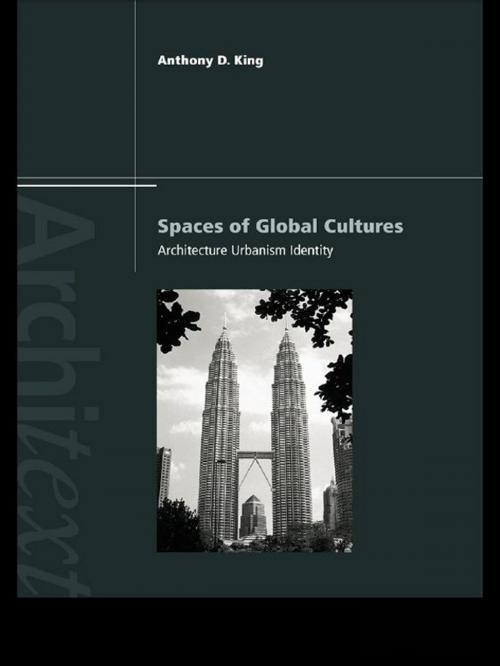Spaces of Global Cultures
Architecture, Urbanism, Identity
Nonfiction, Social & Cultural Studies, Social Science, Human Geography, Art & Architecture, Architecture| Author: | Anthony King | ISBN: | 9781134644452 |
| Publisher: | Taylor and Francis | Publication: | August 2, 2004 |
| Imprint: | Routledge | Language: | English |
| Author: | Anthony King |
| ISBN: | 9781134644452 |
| Publisher: | Taylor and Francis |
| Publication: | August 2, 2004 |
| Imprint: | Routledge |
| Language: | English |
This book brings together a series of new and historical case studies to show how different phases of globalization are transforming the built environment. Taking a broad interdisciplinary approach, the author draws on sociological, geographical, cultural and postcolonial studies to provide a critical account of the development of three key concepts: global culture, post colonialism, and modernity. Subsequent case studies examine how global economic, political and cultural forces shape the forms of architectural and urban modernity in globalized suburbs and spaces in major cities worldwide.
The first book to combine global and postcolonial theoretical approaches to the built environment and to illustrate these with examples, Spaces of Global Cultures argues for a more historical and interdisciplinary understanding of globalization: one that places material space and the built environment at the centre and calls for new theories to address new conditions.
This book brings together a series of new and historical case studies to show how different phases of globalization are transforming the built environment. Taking a broad interdisciplinary approach, the author draws on sociological, geographical, cultural and postcolonial studies to provide a critical account of the development of three key concepts: global culture, post colonialism, and modernity. Subsequent case studies examine how global economic, political and cultural forces shape the forms of architectural and urban modernity in globalized suburbs and spaces in major cities worldwide.
The first book to combine global and postcolonial theoretical approaches to the built environment and to illustrate these with examples, Spaces of Global Cultures argues for a more historical and interdisciplinary understanding of globalization: one that places material space and the built environment at the centre and calls for new theories to address new conditions.















